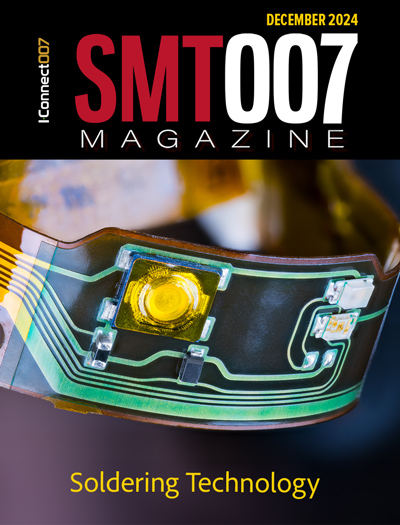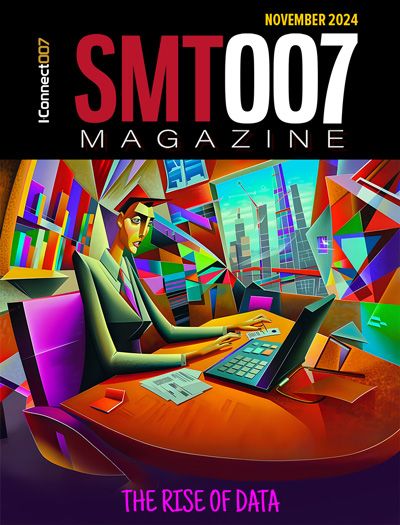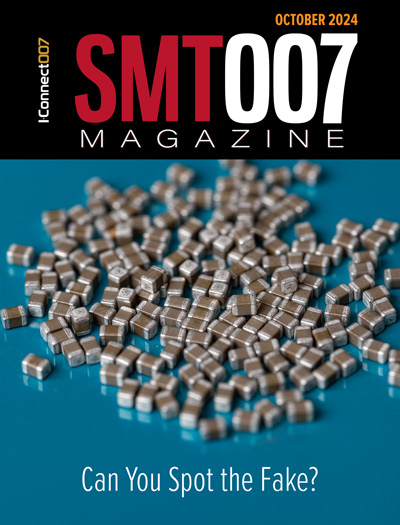-

- News
- Books
Featured Books
- smt007 Magazine
Latest Issues
Current Issue
Soldering Technologies
Soldering is the heartbeat of assembly, and new developments are taking place to match the rest of the innovation in electronics. There are tried-and-true technologies for soldering. But new challenges in packaging, materials, and sustainability may be putting this key step in flux.

The Rise of Data
Analytics is a given in this industry, but the threshold is changing. If you think you're too small to invest in analytics, you may need to reconsider. So how do you do analytics better? What are the new tools, and how do you get started?

Counterfeit Concerns
The distribution of counterfeit parts has become much more sophisticated in the past decade, and there's no reason to believe that trend is going to be stopping any time soon. What might crop up in the near future?
- Articles
- Columns
Search Console
- Links
- Media kit
||| MENU - smt007 Magazine
Young Professionals Spotlight: Process Engineer Kevin Dial, American Standard Circuits
September 5, 2024 | Dan Beaulieu, D.B. Management GroupEstimated reading time: 2 minutes
When I heard that my friends at American Standard Circuits had hired a new, fresh-out-of-college process engineer, I was anxious to meet him. Now, you get to read this interview. It’s a rare perspective of a young man new to our industry.
Dan Beaulieu: Kevin, tell me about your journey to America Standard, and what is your position now with ASC?
Kevin Dial: I joined ASC as a wet process engineer in the summer of 2022 after graduating from the University of Iowa. It’s hard to believe two years flew by that quickly, but here we are.
Beaulieu: You’re becoming a veteran by now. What are your daily responsibilities?
Dial: My biggest focus is on circuit formation steps, including imaging, via plating, and etching. Then, I monitor results through AOI and ET. It is a wide-ranging mandate where I can design controls for critical processes and investigate fascinating chemistry. The process engineering team is also putting a lot of effort into refining our registration control scheme from post-etch punch to primary drill tooling. Our exotic material sets often demand that we dig deep into the first principles of a challenge and deploy engineering tools in thoughtful, unique ways. The job generally boils down to constructing flexible, resource-efficient processes that execute our diverse, high-technology product mix.
Beaulieu: What is your background?
Dial: I am a trained chemical engineer with a minor in business administration. The curriculum balanced my interests in industrial process design, undergraduate electrochemical research, and the fundamentals of business organizations. My undergraduate thesis project was a modular gas-to-liquids hydrocarbon synthesis unit that could be transported between decommissioned oil wells to capture methane into useful products. It won a national student team design competition, one of my proudest professional achievements.
Beaulieu: What drew you to ASC?
Dial: As a problem solver, growth only happens outside one’s comfort zone. Three years ago, I couldn’t pick a PCB out of a police lineup, but I was intrigued by all the unfamiliar chemical processes. I figured I could use my background in electroplating as a launch point into the electro-, photo-, and thermal chemistry I didn’t know. I also saw a tight-knit, experienced engineering team that could support my inquiries. The first couple of months were like drinking out a firehose and probably the most educational experience of my life.
Beaulieu: Were you drawn at all by the technology?
Dial: Yes, 100%. Learning PCBs was one thing, but learning our technology set is entirely different. Understanding the unique challenges of running such a diverse set of thermal management solutions, RF/microwave designs, mixed-material builds, embedded passive components, and HDI features is a continuous process that keeps me excited to come to work every day. Every panel is an engineering marvel.
To read this entire conversation, which appeared in the August 2024 issue of PCB007 Magazine, click here.
Suggested Items
Murata to Acquire Sensoride Corporation
12/25/2024 | MurataMurata Manufacturing Co., Ltd. announces that Murata Electronics North America, Inc., a subsidiary of Murata, has entered into an agreement to acquire Sensoride Corporation (hereinafter referred to as 'Sensoride') on December 20, 2024, U.S. time.
IPC Announces New Training Course: PCB Design for Military & Aerospace Applications
12/23/2024 | IPCIPC announced the launch of a new training course: PCB Design for Military & Aerospace Applications.
Beyond Design: AI-driven Inverse Stackup Optimization
12/26/2024 | Barry Olney -- Column: Beyond DesignArtificial intelligence (AI) is transforming how we conceptualize and design everything from satellites to PCBs. Traditionally, stackup planning is a manual process that can be multifaceted and relies heavily on the designer's expertise. Despite having best practices and various field solvers to optimize parameters, stackup planning remains challenging for complex designs with advanced packaging, several layers, multiple power pours, and controlled impedance requirements.
Statistically Testing Inner Layer Yield Improvement Projects
12/18/2024 | Dr. Patrick Valentine, UyemuraCan we trust our measurement system to give us reliable data? Is it accurate, repeatable, and reproducible? Measurement is the foundation of quality. We measure for two primary reasons: to make decisions on product quality and to provide data that will inform continuous improvement projects. We can engage in continuous improvement projects if we are confident in our measurement systems.
SCHMID Group Unveils Enhanced InfinityLine H+ for Electroless Copper Deposition
12/16/2024 | SCHMID GroupThe SCHMID Group, a global leader in high-tech solutions for the electronics industry, proudly announces significant updates to its flagship InfinityLine H+ Electroless Cu system. Specifically designed for the production of high- performance advanced packaging applications using mSAP and SAP processes, the system reflects SCHMID’s expertise in horizontal electroless copper deposition.


